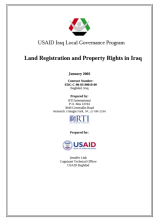Land Library
Welcome to the Land Portal Library. Explore our vast collection of open-access resources (over 74,000) including reports, journal articles, research papers, peer-reviewed publications, legal documents, videos and much more.
/ library resources
Showing items 1 through 9 of 55.Land registration and property rights in Iraq have deep historical foundations reaching back to the Hammurabic period. However, the current land registration system owes more to the 400-year Ottoman occupation of Iraq and the subsequent interval under the British mandate.
Assesses the process of rural land registration in Mozambique and the outcomes for poor and marginalised groups.
Assesses the process of land registration in peri-urban areas of Mozambique and its outcomes for poor and marginalised groups. The research finds that there is little awareness of land registration processes on the part of low-income groups.
Assesses the process to establish a system of land registration and improve land tenure security, and its outcomes for poor and marginalised groups in Amhara, Ethiopia .The registration process is found to be generating conflict at the local level, due to illegal land grabbing, encroachments into
Assesses the process of rural land registration in Ghana and its outcomes for poor and marginalised groups.In Ghana, deeds registration has been in place since colonial times, and enables right holders to record their land transactions.
This case study assesses the strengths and weaknesses of a simple, inexpensive, village-based land registration system put in place between 1996 and 1998 in Tigray, Ethiopia.The authors found that the system worked well and fairly - in large part due to it’s simplicity and low cost.
This report summarise the research findings of a project to examine the current processes of land rights registration in Ethiopia, Ghana, and Mozambique and assess their outcomes for poor and vulnerable groups.
Since the early 1990s, the dominant consensus in the debate on land rights reform in sub-Saharan Africa has been that external interventions to privatise land rights are usually inappropriate and likely to remain so.
With land being the main source of income for many people in the developing world, security of access or ownership rights is imperative to the alleviation of rural povety.




